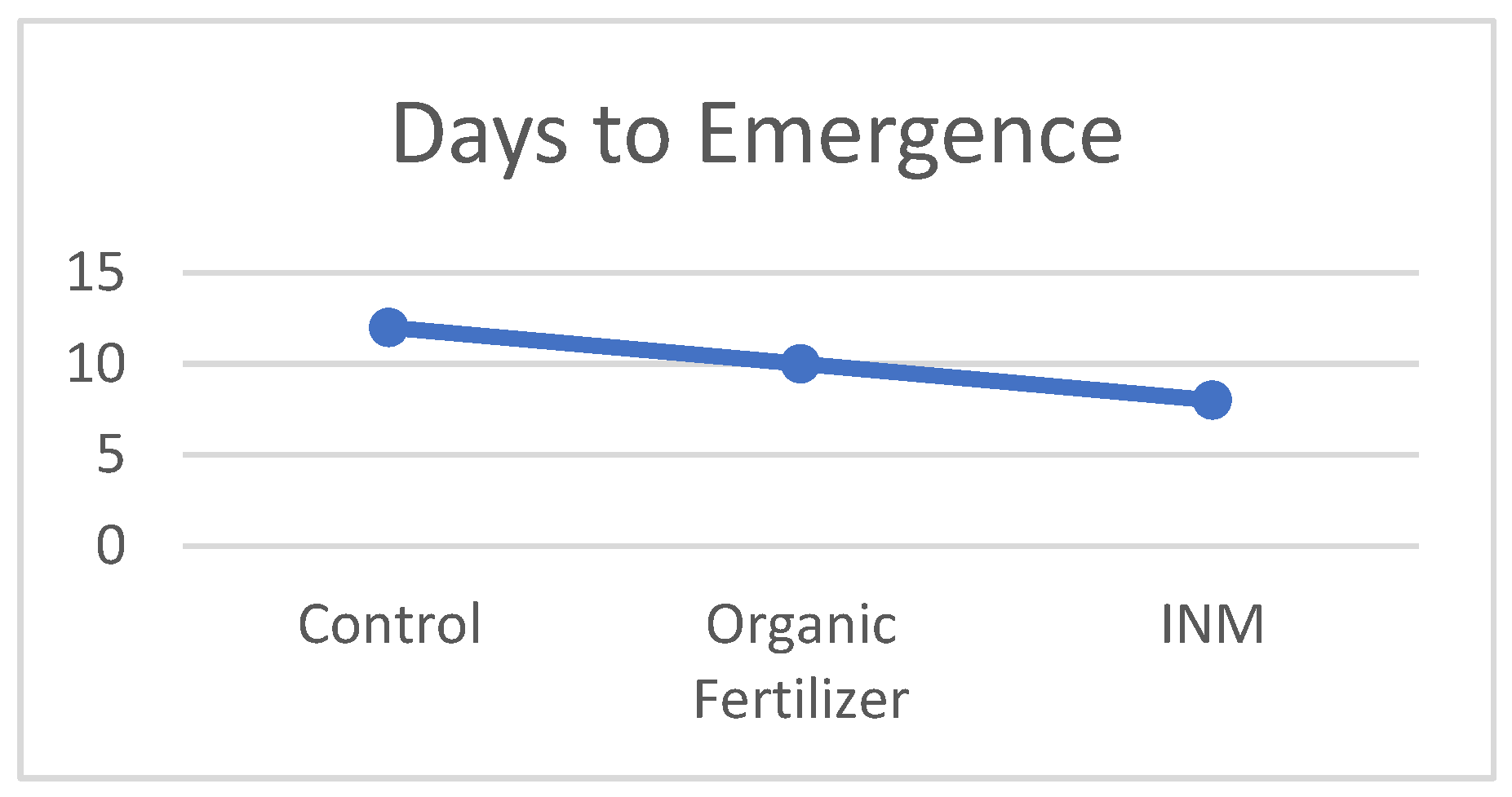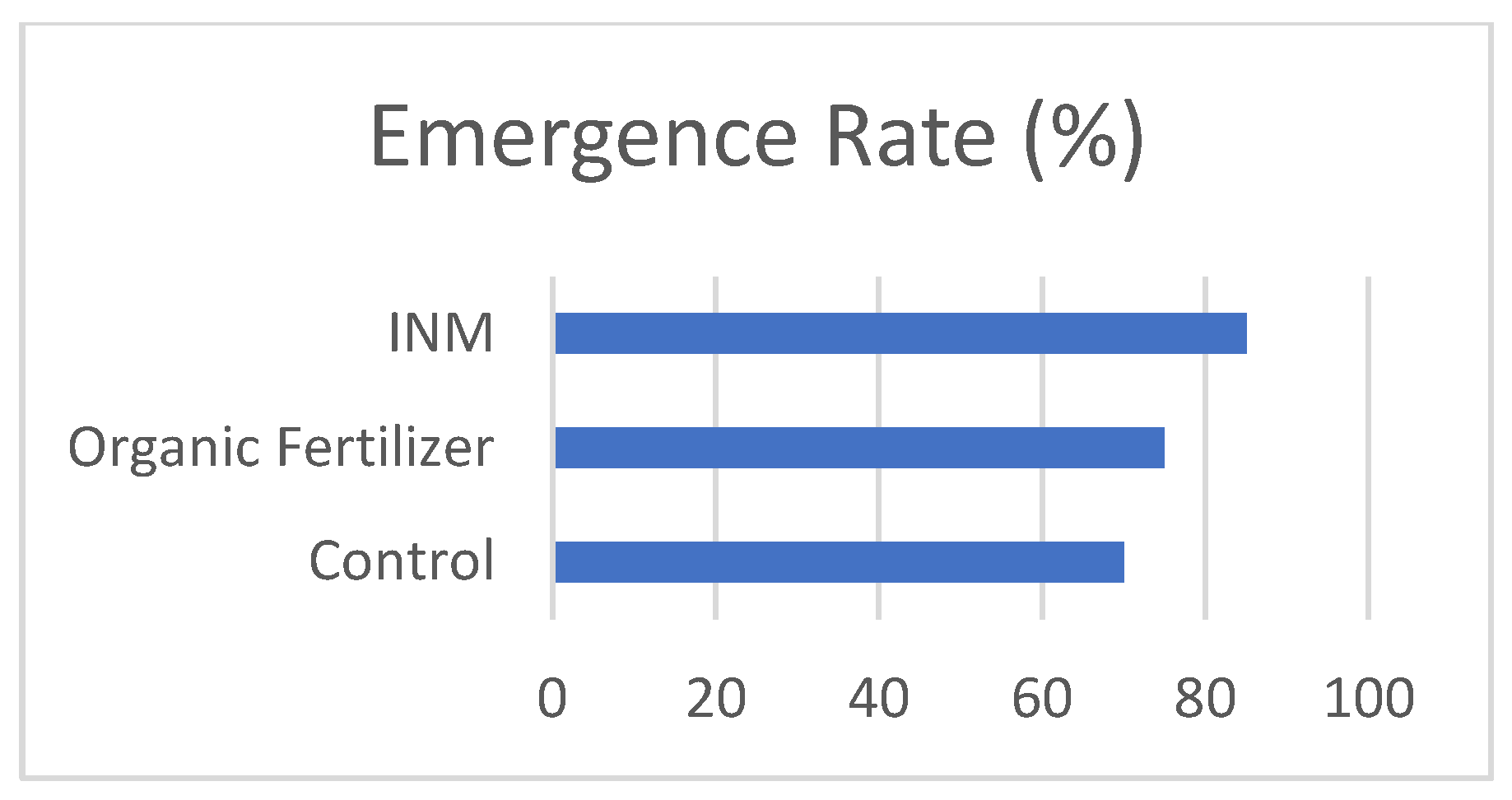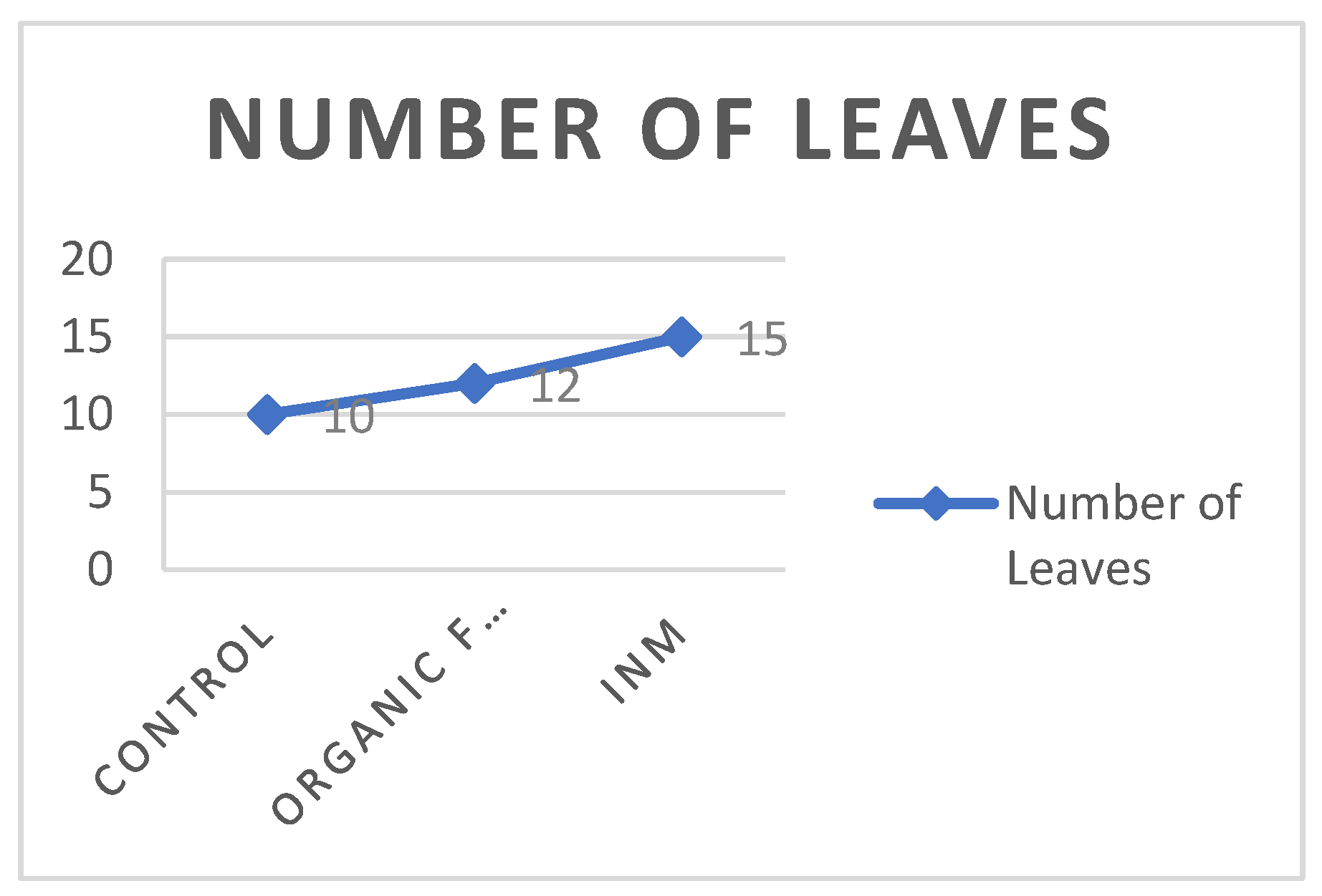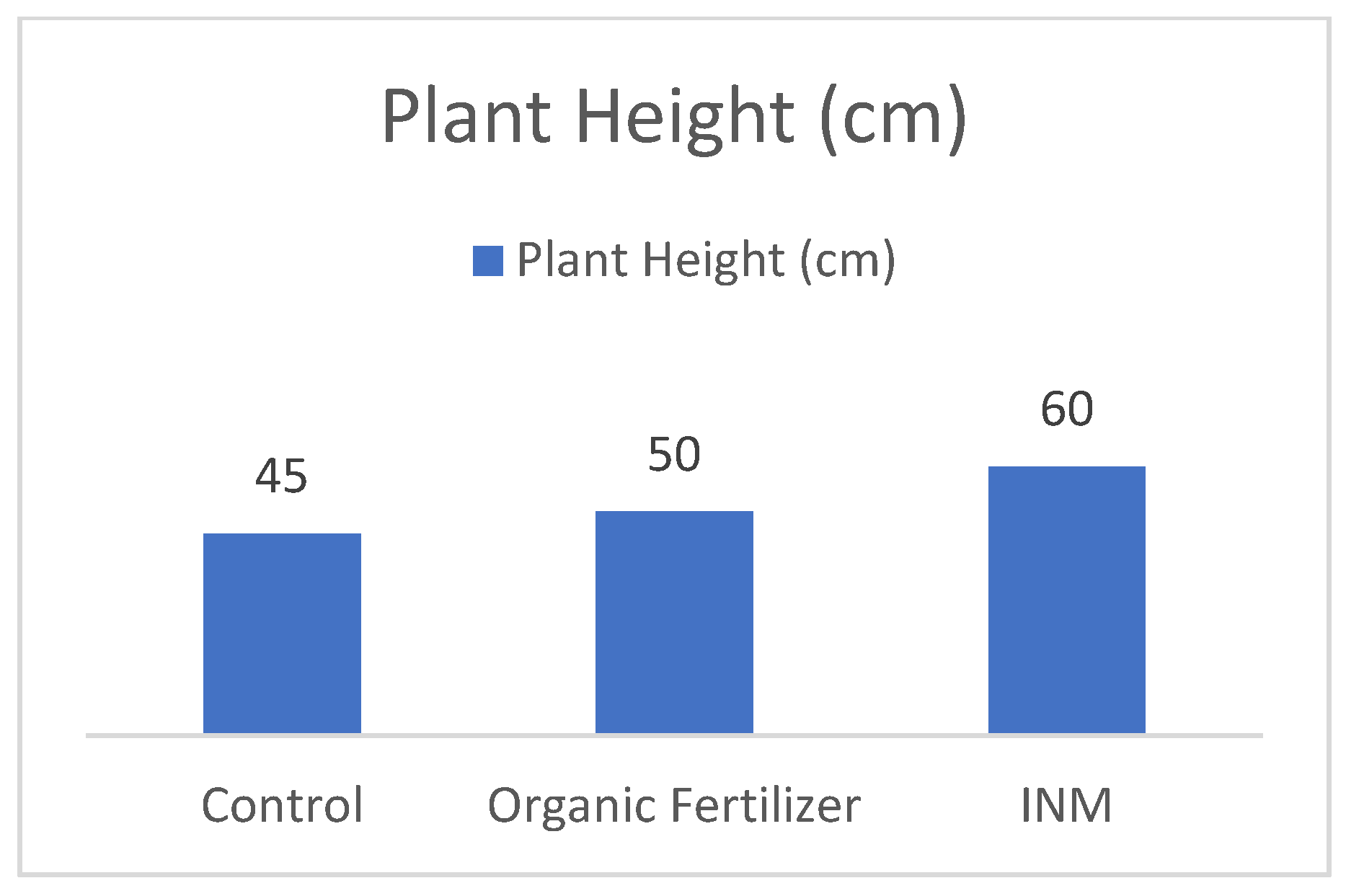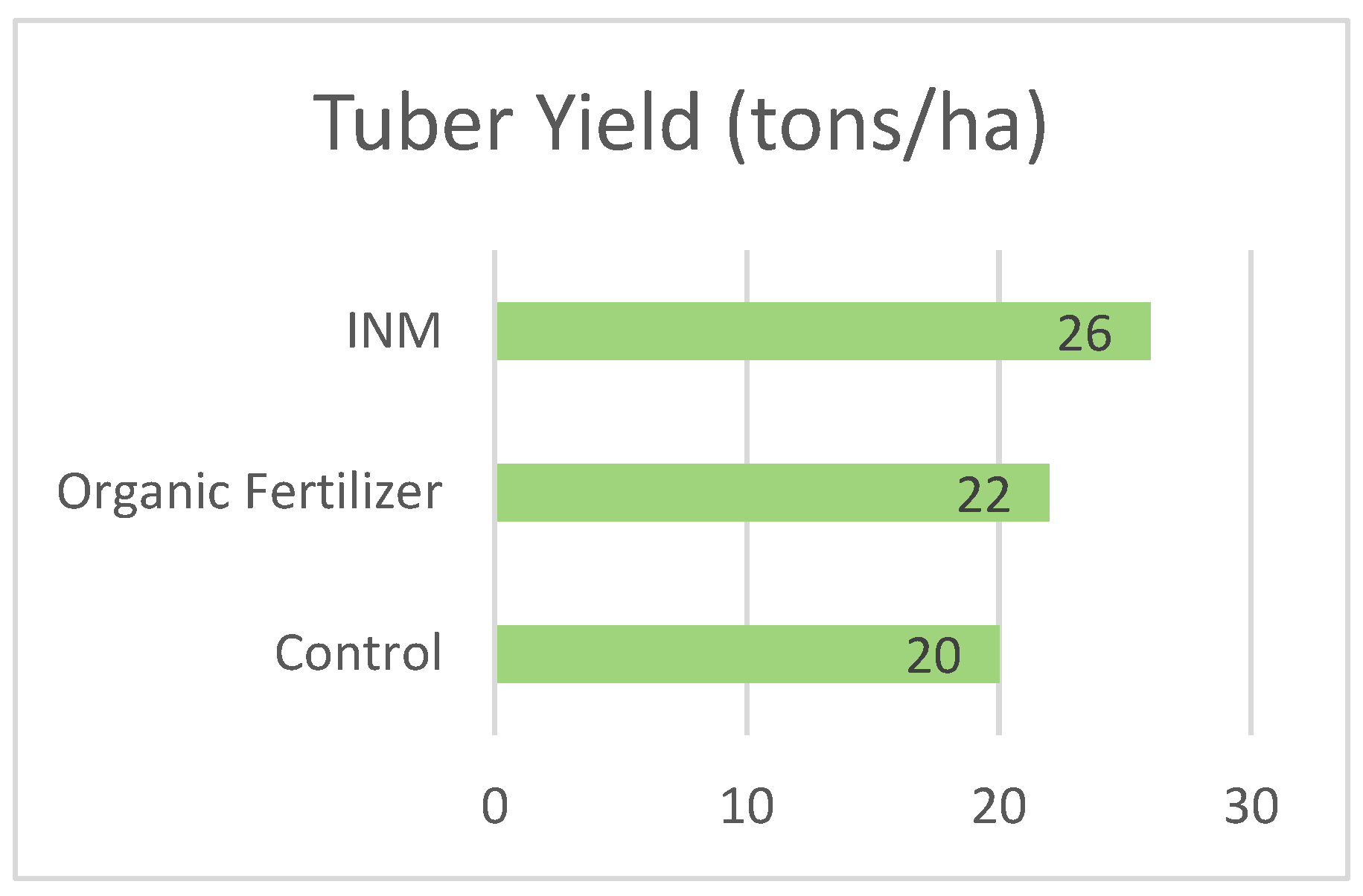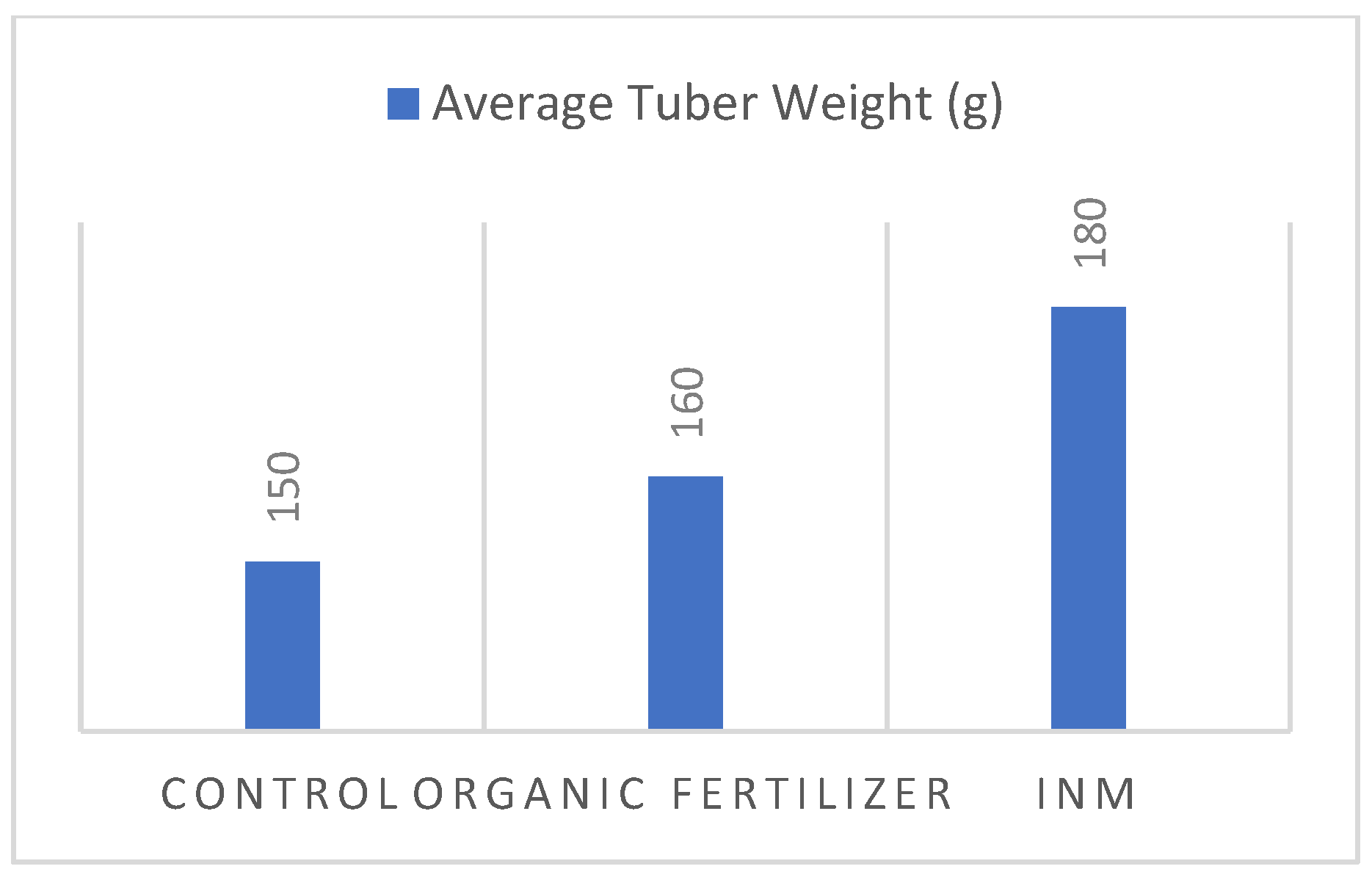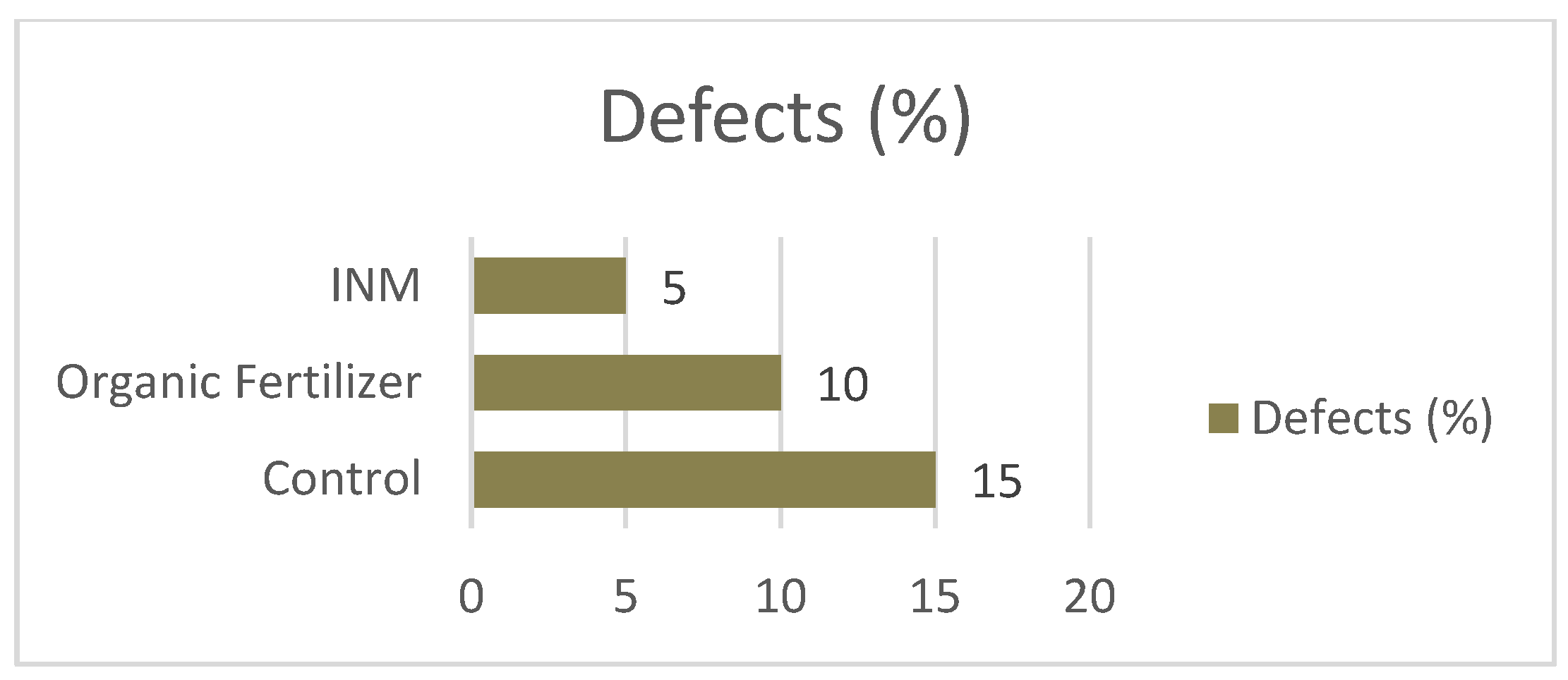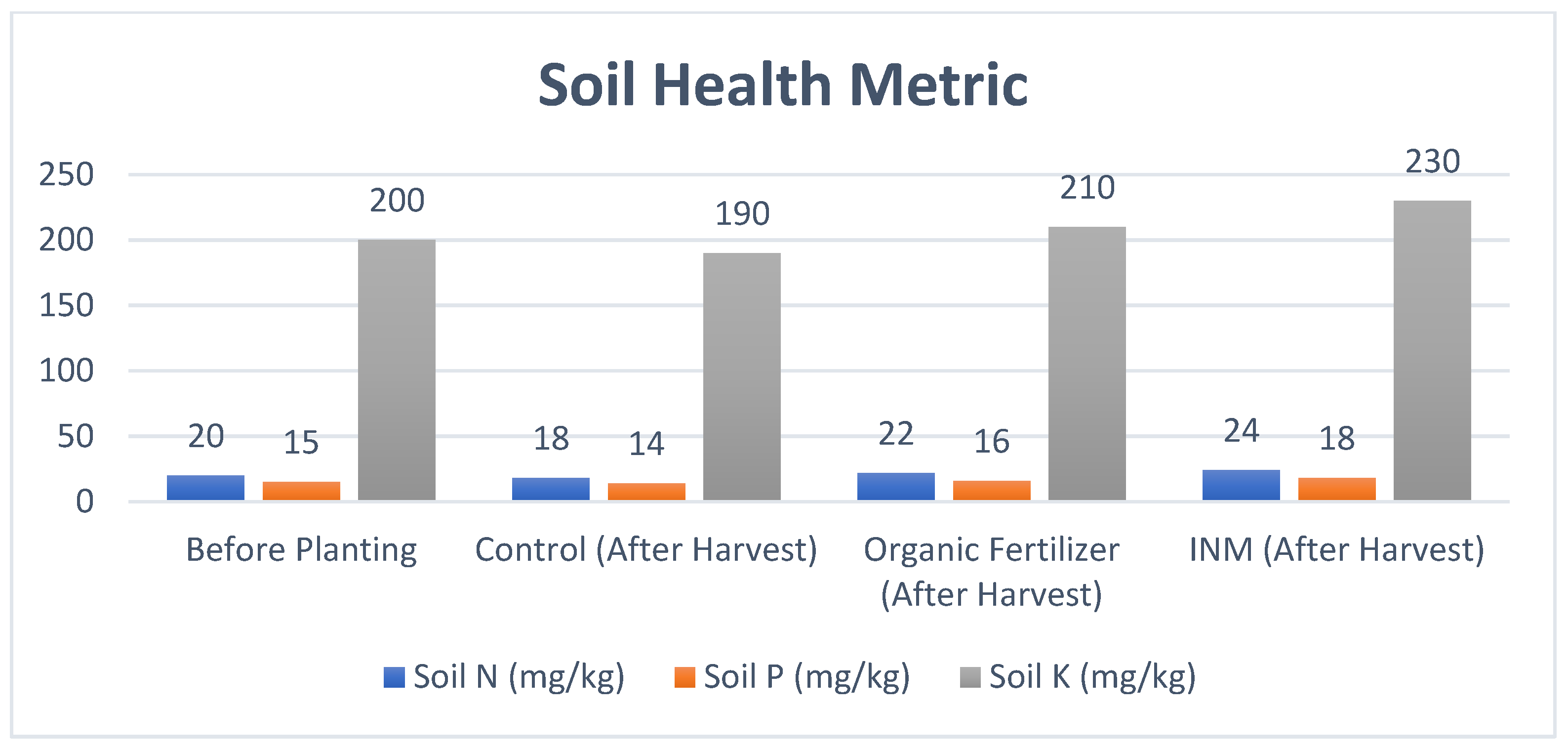1. Introduction
Potato (Solanum tuberosum L.) is a major staple crop worldwide, renowned for its nutritional value and economic significance. In Bangladesh, potato cultivation plays a crucial role in ensuring food security and generating income for smallholder farmers. The crop is extensively grown in various agro-ecological zones, with the coastal regions of Gopalganj presenting unique challenges and opportunities for potato production. To maximize yield and quality, effective nutrient management practices are essential. This study aims to investigate the impact of integrated nutrient management (INM) practices on potato yield and quality in the coastal regions of Bangladesh. Integrated Nutrient Management (INM) practices, which combine organic and inorganic fertilizers, have gained attention as a sustainable approach to enhance crop productivity and soil fertility. Organic fertilizers, such as compost and cow manure, improve soil structure, enhance microbial activity, and provide a slow release of nutrients (Hosseini et al., 2016). In contrast, inorganic fertilizers, including urea, triple super phosphate (TSP), and muriate of potash (MOP), offer immediate nutrient availability, promoting rapid plant growth (Islam et al., 2018). Research has shown that the synergistic effects of combining organic and inorganic fertilizers can lead to increased crop yields and improved soil health (Choudhary et al., 2019).
In Bangladesh, the coastal regions, including Gopalganj, are particularly vulnerable to the impacts of climate change, such as increased salinity, erratic rainfall patterns, and rising sea levels (Khan et al., 2019). These environmental challenges necessitate the adoption of resilient agricultural practices that can withstand stresses while ensuring high productivity. Integrated nutrient management practices offer a promising solution by balancing immediate nutrient needs with long-term soil health benefits. Several studies have highlighted the benefits of INM practices for various crops. Rahman et al. (2020) reported that the integration of organic and inorganic fertilizers resulted in higher potato yields and better tuber quality compared to using either type of fertilizer alone. The combined application of compost and inorganic fertilizers was found to enhance soil organic matter, nutrient availability, and microbial biomass, contributing to sustainable agricultural production. Similarly, Ali et al. (2017) emphasized the importance of maintaining soil fertility through INM practices, which can mitigate the adverse effects of long-term inorganic fertilizer use, such as soil degradation and nutrient leaching.
Despite the extensive research on INM practices, there is a need for localized studies that consider specific crop varieties and agro-ecological conditions. The present study aims to address this gap by examining the effects of INM practices on the emergence rate, growth, yield, and quality of BARI Potato-7 (Diamant) in the coastal regions of Gopalganj, Bangladesh. BARI Potato-7, developed by the Bangladesh Agricultural Research Institute (BARI), is a high-yielding and disease-resistant variety, making it an ideal candidate for this study.
The primary objective of this research is to evaluate the impact of INM practices on potato yield and quality, as well as on soil health. The study will compare traditional fertilization practices, organic fertilizers, and INM practices to determine their effects on potato productivity and soil parameters. The hypothesis posits that INM practices will result in higher yields, improved tuber quality, and enhanced soil health compared to traditional and solely organic fertilization methods. Soil health is a critical factor influencing crop productivity and sustainability. Healthy soils support robust plant growth, efficient nutrient uptake, and resilience to environmental stresses. In this study, baseline nutrient levels and soil pH will be analyzed before planting to establish a reference point for assessing the effects of different nutrient management practices. The findings of this research will provide valuable insights into optimizing fertilization strategies for potato cultivation in coastal Bangladesh, contributing to food security and sustainable agricultural development.
By promoting the adoption of INM practices, this study aims to enhance the resilience and productivity of local farmers, ensuring better livelihoods and environmental sustainability. The results of this research will inform policy recommendations and extension services, guiding farmers in making informed decisions about nutrient management to achieve optimal potato production.
2. Materials and Methods
2.1. Experimental Setup:
The experiment was conducted at the coastal region of Gopalganj, Bangladesh, known for its diverse agro-ecological conditions. The area experiences significant climatic variations, making it an ideal location to study the impacts of different nutrient management practices on potato cultivation. A randomized complete block design (RCBD) was employed to ensure the reliability and reproducibility of results. The experiment consisted of three treatment groups: traditional fertilization practices (control), organic fertilizers, and integrated nutrient management (INM) practices. Each treatment was replicated in three separate plots, with each plot measuring 10m x 10m. In case of traditional fertilization (control) Inorganic Fertilizers like Urea, Triple Super Phosphate (TSP), and Muriate of Potash (MOP) were taken. The application rate of urea 250 kg/ha, TSP 200 kg/ha, MOP 150 kg/ha. Since, 1 hectare (ha) = 10,000 square meters (m²) and plot size: 10m x 10m = 100 m². The equation to calculate the amount of fertilizer needed for a plot, given an application rate per hectare, is:
So, Amount of Urea needed for 100 m² = (250 kg/10,000 m²) x 100 m² = 2.5 kg. TSP needed 2 kg and MOP needed 1.5 kg for the selected plot. In case of organic fertilization compost and cow manure were applied. The application rate of compost 20 tons/ha, cow manure 10 tons/ha So, 200 kg of compost and 100 kg of cow manure needed for the selected plot. And in case of Integrated Nutrient Management (INM) a combination of organic and inorganic fertilizers were applied. Where the application rate of compost 10 tons/ha, cow manure 5 tons/ha, urea 125 kg/ha, TSP 100 kg/ha, MOP 75 kg/ha. So, for the plot we needed 100 kg of compost, 50 kg of cow manure, 1.25 kg of urea, 1 kg of TSP and 0.75 kg MOP. The experiment takes on BARI Alu-7 (Diamant), seed rate of this 2000 kg/ha. So, for each plot we needed 20 kg potato. For three plot we needed 60 kg potato. The soil was plowed, harrowed, and leveled to create a suitable seedbed. Soil samples were collected before planting to analyze baseline nutrient levels and soil pH. Potato tubers were planted in rows, maintaining a spacing of 75 cm between rows and 20 cm between plants. Planting was done manually to ensure uniformity across all plots. Plots were irrigated as required, ensuring that soil moisture was maintained at optimal levels throughout the growing season.
2.2. Data Collection
Emergence Rate: The percentage of seedling emergence was recorded 15 days after planting. Plant height measured weekly from the base to the tip of the plant. Number of leaves counted weekly. Takes total weight of tubers harvested from each plot. Tuber quality evaluated based on size, shape, and the presence of any defects or diseases. Soil pH measured before planting and after harvest using a pH meter. Soil nutrient levels analyzed for N, P, and K content before planting and after harvest. Microbial activity assessed using soil respiration tests and microbial biomass carbon (MBC) measurements.
2.3. Statistical Analysis
Data were analyzed using analysis of variance (ANOVA) to determine the significance of differences between treatments. Post-hoc tests (e.g., Tukey's HSD) were performed to compare means, and results were considered significant at p < 0.05. Statistical software (e.g., SPSS or R) was used for data analysis.
3. Results
The results of this study provide insights into the impact of different nutrient management practices on the emergence rate, growth, yield, and quality of BARI Potato-7, as well as on soil health.
3.1. Emergence Rate and Days to Emergence
The emergence rate and days to emergence were recorded for each treatment group. The INM treatment group exhibited the highest emergence rate and the shortest time to emergence.
Table 1.
Records of Emergence rate (%) and Days to emergence of BARI Alu-7.
Table 1.
Records of Emergence rate (%) and Days to emergence of BARI Alu-7.
| Parameter |
Control |
Organic Fertilizer |
INM |
| Emergence Rate (%) |
70 |
75 |
85 |
| Days to Emergence |
12 |
10 |
8 |
The INM group has the highest emergence rate at 85%, followed by the Organic Fertilizer group at 75%, and the Control group at 70%. This indicates that INM practices significantly improve seedling emergence compared to the other treatments (
Figure 1). The INM group also shows the fastest emergence, with seeds sprouting in just 8 days, compared to 10 days for the Organic Fertilizer group and 12 days for the Control group. This suggests that INM practices enhance early growth performance (
Figure 2).
3.2. Plant Growth Parameters
Weekly measurements of plant height and the number of leaves per plant were taken. The INM group showed superior growth metrics compared to the other groups.
Table 2.
Records of Plant Height and Number of leaves.
Table 2.
Records of Plant Height and Number of leaves.
| Growth Metric |
Control |
Organic Fertilizer |
INM |
| Plant Height (cm) |
45 |
50 |
60 |
| Number of Leaves |
10 |
12 |
15 |
The INM group shows the highest average plant height at 60 cm, followed by the Organic Fertilizer group at 50 cm, and the Control group at 45 cm. This indicates that Integrated Nutrient Management (INM) practices result in better plant growth compared to both traditional and organic-only fertilization methods (
Figure 3). The INM group has the highest number of leaves at 15, followed by the Organic Fertilizer group at 12, and the Control group at 10. This further supports the conclusion that INM practices promote more vigorous plant growth (
Figure 4).
3.3. Tuber Yield and Quality
Tuber yield and quality were assessed at harvest. The INM treatment resulted in the highest yield and best tuber quality, characterized by larger size and fewer defects.
Table 3.
Records of Yield Metric by different group of treatment.
Table 3.
Records of Yield Metric by different group of treatment.
| Yield Metric |
Control |
Organic Fertilizer |
INM |
| Tuber Yield (tons/ha) |
20 |
22 |
26 |
| Average Tuber Weight (g) |
150 |
160 |
180 |
| Defects (%) |
15 |
10 |
5 |
The INM group shows the highest tuber yield at 26 tons/ha, followed by the Organic Fertilizer group at 22 tons/ha, and the Control group at 20 tons/ha. This indicates that Integrated Nutrient Management (INM) practices significantly enhance potato yield compared to both traditional and organic-only fertilization methods (
Figure 5). The INM group also has the highest average tuber weight at 180 g, followed by the Organic Fertilizer group at 160 g, and the Control group at 150 g. This suggests that INM practices contribute to larger and potentially higher quality tubers (
Figure 6). The INM group has the lowest percentage of defects at 5%, compared to 10% in the Organic Fertilizer group and 15% in the Control group. This indicates that INM practices result in healthier, higher-quality tubers with fewer defects (
Figure 7).
3.4. Soil Health Parameters
Soil health parameters, including pH, nutrient levels, and microbial activity, were measured before planting and after harvest. The INM treatment group showed the most significant improvements in soil health (
Table 4).
The INM group maintained the original soil pH of 6.5, indicating a balanced nutrient environment. The control and organic fertilizer groups showed slight decreases in soil pH. The INM group exhibited the highest increase in soil nitrogen, suggesting improved nutrient availability. Soil phosphorus levels were highest in the INM group, indicating better nutrient retention and availability. This group also showed the highest increase in soil potassium levels (
Figure 8)
.
4. Discussion
This study demonstrates that Integrated Nutrient Management (INM) practices significantly improve the yield and quality of BARI Potato-7, as well as enhance soil health in the coastal regions of Gopalganj, Bangladesh. The INM treatment group exhibited the highest emergence rate (85%) and the shortest time to emergence (8 days). These results can be attributed to the balanced nutrient availability provided by the combination of organic and inorganic fertilizers. Organic fertilizers improved soil structure and microbial activity, while inorganic fertilizers ensured immediate nutrient uptake by plants (Hosseini et al., 2016). The plant growth parameters, including plant height and the number of leaves, were also superior in the INM treatment group. The average plant height in the INM group was 60 cm, compared to 50 cm in the organic fertilizer group and 45 cm in the control group. This enhanced growth can be linked to the synergistic effects of organic and inorganic fertilizers, which provide a steady supply of essential nutrients throughout the growing season (Rahman et al., 2020).
Our findings align with previous research indicating that INM practices can lead to improved crop performance and soil health. Choudhary et al. (2019) reported similar results, where the integration of organic and inorganic fertilizers resulted in higher potato yields and better tuber quality compared to using either type of fertilizer alone. The enhanced soil microbial activity and nutrient availability observed in this study are consistent with the findings of Singh and Singh (2020), who highlighted the long-term benefits of combining organic and inorganic nutrient sources.
Moreover, the positive impact of INM practices on soil health, including increased soil pH, nutrient levels, and microbial activity, supports the results of Ali et al. (2017), who emphasized the importance of maintaining soil fertility for sustainable agricultural production. The improved soil health parameters in the INM treatment group suggest that such practices can mitigate the adverse effects of long-term inorganic fertilizer use, which often leads to soil degradation and nutrient leaching (Khan et al., 2019).
The practical implications of this study are significant for farmers in Bangladesh and similar agro-ecological regions. The adoption of INM practices can enhance potato yield and quality, ensuring better returns for farmers. The balanced approach of integrating organic and inorganic fertilizers not only meets the immediate nutrient demands of the crop but also promotes long-term soil health. This dual benefit is crucial for sustainable agricultural practices, especially in regions facing climate variability and soil fertility challenges (Haque et al., 2018). Economic analysis revealed that INM practices, despite higher initial costs, are more cost-effective in the long run due to reduced fertilizer inputs and improved crop yields. This finding aligns with the economic assessments of Rahman et al. (2020), who reported that the long-term benefits of INM practices outweigh the initial investment costs. Consequently, promoting the adoption of INM practices can contribute to food security and economic stability in farming communities.
While this study provides valuable insights, it is limited to a single growing season. Future research should include multi-season trials to validate the findings and assess the long-term impacts of INM practices on potato yield, quality, and soil health. Additionally, exploring the potential of INM practices in other crops and regions can provide a broader understanding of their applicability and benefits.
Further studies should also investigate the specific mechanisms through which organic and inorganic fertilizers interact to enhance crop performance and soil health. Understanding these mechanisms can help refine INM strategies and tailor them to specific crops and environmental conditions. Additionally, assessing the socio-economic factors influencing the adoption of INM practices can inform policy recommendations and extension services aimed at promoting sustainable agriculture (Islam et al., 2018).
5. Conclusions
In conclusion, the findings of this study underscore the potential of Integrated Nutrient Management practices to enhance potato yield and quality while maintaining soil health. The balanced approach of combining organic and inorganic fertilizers offers a sustainable solution to the nutrient management challenges faced by farmers in coastal Bangladesh. These results highlight the importance of promoting INM practices for sustainable agricultural development and food security.
References
- Haque, M. A., Rahman, M. M., & Karim, M. R. (2018). Potato production in Bangladesh: Challenges and prospects. Journal of Agricultural Research, 12(2), 145-157.
- Ali, M. A., Hossain, M. Z., & Roy, T. S. (2017). Impact of organic and inorganic fertilizers on crop yield and soil properties. Bangladesh Journal of Agronomy, 25(3), 220-230.
- Choudhary, M., Singh, R., & Sharma, S. (2019). Integrated nutrient management for sustainable potato production. Journal of Plant Nutrition, 42(5), 583-598.
- Rahman, M. S., Hossain, M. A., & Islam, M. S. (2020). Sustainable agriculture through integrated nutrient management. Soil Science and Plant Nutrition, 66(2), 267-276.
- Singh, J., & Singh, N. (2020). Long-term effects of inorganic fertilizers on soil health. Soil Science and Plant Nutrition, 66(1), 15-25.
- Khan, M. S. A., Kabir, G. M. R., & Hossain, M. F. (2019). Climate change impacts on coastal agriculture in Bangladesh. Environmental Management, 64(3), 214-229.
- Hosseini, M., Maftoun, M., & Karami, A. (2016). Benefits of organic fertilizers in sustainable agriculture. Agricultural Reviews, 37(2), 145-156.
- Ferdous Z, Datta A, Anal A K, Anwar M and Khan MR (2016). Development of home garden model for year round production and consumption for improving resource-poor household food security in Bangladesh. NJAS - Wageningen Journal of Life Science, 78: 103–110. [CrossRef]
- Ferdous Z, Sarkar MAR and Hasan AK (2005). Effect of variety and split application of nitrogen on yield of wheat. Bangladesh Journal of Seed Science and Technology, 8: 97–103.
- Foley JA, Ramankutty N, Brauman KA, Cassidy ES, Gerber JS, Johnston M et al. (2011). Solutions for a cultivated planet, Nature 478: 337–342. Gomez KA, Gomez AA. (1984). Statistical Procedures for Agricultural Research. Intl. Rice Res. Inst. Philippines, pp. 187-233.
- Hasan AK, Ferdous Z, Rahman AKMM and Mahmud NU. (2006). Yield and yield components of wheat as influenced by tillage, fertilizer level and water regime. Journal of Agricultural Education and Technology, 9: 123–126.
- Hossain MA and Miah MAM (2012) Post harvest losses and technical efficiency of potato storage systems in Bangladesh. Available at: http://www.nfpcsp.org/agridrupal/sites/default /files/Ayub-final_Report_CF2.pdf.
- Imas P and Bansal SK (2012) Potassium and Integrated Nutrient Management in Potato. Available at: http://www.ipipotash.org/presentn/kinmp.html (Accessed 15 August 2012).
- Cassman, K.G., Dobermann, A. and Walters, D.T. Agro ecosystems, nitrogen use efficiency and nitrogen management. Ambio, 2002; 31:132-140.
- Witt, C. and Dobermann, A. Toward a decision support system for site-specific nutrient management. In: Dobermann, A., Witt, C. and Dawe, D. (Eds.), Increasing the productivity of intensive rice systems through site-specific nutrient management. Science Publishers, Inc., and International Rice Research Institute (IRRI), Enfield, NH (USA) and Los Baños (Philippines), 2004; pp. 359-395.
- Li, Y., Simunek, J., Zhang, Z., Jing, L. and Ni, L. Evaluation of nitrogen balance in a direct-seededrice field experiment using Hydrus-1D. Agril. Water Mgt. 2015; 148: 213–222.
- Pittelkow, C.M., Liang, X., Linquist, B.A., Groenigen, K.J.V., Lee, Juhwan, Lundy, M.E., Gestel, N. van, Six, J., Rodney, T.V. and Kessel, C.van, Productivity limits and potentials of the principles of conservation agriculture. Nature, 2015; 517:365-370. [CrossRef]
- Meena, V.S., Maurya, B.R., Verma, R. and Meena, M.D. Effect of concentrate manure and different levels of nutrients on growth and yield of rice in eastern Uttar Pradesh. Ann. Biolo. 2013. 29 (2), 158-163.
- Prasad, R. Integrated plant nutrient supply system (IPNS) for sustainable agriculture. Indian J. Ferti., 2008; 4 (12): 71-90. 21. Meena, O.P., Maurya, B.R., Meena, V.S. Influence of K- solubilizing bacteria on release of potassium from waste mica. Agri. Sustain. Dev. 2013. 1(1), 53-56.
- Islam MZ, Zamam MM, Hossain MM and Hossain A (2009) Integrated nutrient management with liming for potato production in North-West region of Bangladesh. Annual Report 2008- 2009, Tuber Crops Research Centre, Bangladesh Agricultural Research Institute, Gazipur, Bangladesh.
- Khan MS, Shil NC and Noor S (2008) Integrated nutrient management for sustainable yield of major vegetable crops in Bangladesh. Bangladesh Journal of Agriculture and Environment, 4: 81-94.
- Mal B, Mahapatra P, Mohanty S (2014). Effect of diazotrophs and chemical fertilizers on production and economics of okra (Abelmoschus esculentus L.) cultivars. American Journal of Plant Science, 5: 168–174. [CrossRef]
- Manivannan S, Balamurugan M, Parthasarathi K, Gunasekara G, Ranganathan LS (2009). Effect of vermicompost on soil fertility and crop productivity- beans (Phaseolus vulgaris). Journal of Environmental Biology, 30: 275–281.
- Abebe Z, Tolera A, Tusa D and Kanampiu F (2013). Potato yield response to crop rotation, farmyard manure and inorganic fertilizer application in Western Ethiopia. African Journal of Agricultural Research, 8(46): 5889–5895.
- Achieng JO, Ouma G, Odhiambo G and Muyekho F (2010). Effect of farmyard manure and inorganic fertilizers on potato production on Alfisols and Ultisols in Kakamega, western Kenya. Agriculture and Biology Journal of North America, 1(4): 430– 439.
- Ahmed NU, Mahmud NU, Salim M, Halder SC and Ullah H (2017) Yield maximization of potato (Solanum tuberosum L) through integrated nutrient management system. International Journal of natural and Social Sciences, 4 (1): 49– 56.
- Anowar MM, Ferdous MZ and Islam M (2012). Determination of nutrient management for potatomungbean-T. aman based cropping pattern. Bangladesh Journal of Progressive Science & Technology, 10(2): 173-176.
- Anowar M, Parveen A, Ferdous Z, Kafi AH and Kabir ME (2015). Baseline survey for farmer livelihood improvement at farming system research and development, Lahirirhat, Rangpur. International Journal of Business, Management and Social Research, 2: 92–104.
- Chaudhary, S.K. and Thakur, R.B. (2007). Efficient farmyard manure management for sustained productivity of rice (Oryza sativa)-wheat (Triticum aestivum) cropping system. Indian journal of agricultural science, 77(7): 443-444.
- Sharma, U. and Subehia, S.K. (2014). Effect of long-term integrated nutrient management on rice (Oryza sativa L.)-wheat (Triticum aestivum L.) productivity and soil properties in North-Western Himalaya. Journal of the Indian Society of Soil science, 62(3): 248-254.
- Patra, A.K.; Mishra, K.N.; Garnayak, L.M. and Mohanty, A.K. (2017). Influence of long-term organic nutrient management on soil quality and crop productivity in rice (Oryza sativa)-potato (Solanum tuberosum)-okra (Abelmoschus esculentus) cropping system under irrigated condition. Indian Journal of Agronomy, 62(3): 268-274. [CrossRef]
- Moharana, P.C.; Sharma, B.M.; Biswas, D.R.; Dwivedi, B.S. and Singh, R.V. (2012). Long-term effect of nutrient management on soil fertility and soil organic carbon pools under a 6-yearold pearlmillet–wheat cropping system in an Inceptisol of subtropical India. Field Crops Research, 136: 32–41.
- Prasad, J.; Karmakar, S.; Kumar, R. and Mishra, B. (2010). Influence of integrated nutrient management on yield and soil properties in maize-wheat cropping system in an Alfisol of Jharkhand. Journal of the Indian Society of Soil Science, 58(2): 200-204.
- Kumar, S. and Sharma, M.K. (2015). Effect of zinc and farmyard manure on yield and nutrient content of vegetable pea (Pisum sativum L.). Progressive Horticulture, 47(1): 112-115. [CrossRef]
- Kundu, S.; Prakash, V.; Ghosh, B.N.; Singh, R.D. and Srivastva, A.K. (2002). Quantitative relationship between annual carbon inputs and soil organic carbon build-up in soybean (Glycine max)–wheat (Triticum aestivum) cropping sequence. In 2nd International Agronomy Congress, 26-30.
- Rudrappa, L.; Purakayastha, T.J.; Singh, D. and Bhadraray, S. (2006). Long-term manuring and fertilization effects on soil organic carbon pools in a Typic Haplustept of semi-arid sub-tropical India. Soil and Tillage Research, 88(1-2): 180-192. [CrossRef]
- Yadav, R.L.; Dwivedi, B.S. and Pandey, P.S. (2000). Ricewheat cropping system: assessment of sustainability under green manuring and chemical fertilizer inputs. Field Crops Research, 65(1): 15-30. [CrossRef]
- BBS (2013). Yearbook of Agricultural Statistics of Bangladesh, 2011. Statistics Division, Ministry of Planning, Government of the People’s Republic of Bangladesh, Dhaka, Bangladesh.
- Bundy LG and Andraski TW (2005). Recovery of fertilizer nitrogen in crop residues and cover crops on an irrigated sandy soil. Soil Science Society of American Journal, 69: 640–648. [CrossRef]
- Ghosh, S.; Wilson, B.; Ghoshal, S.K.; Senapati, N. and Mandal, B. (2010). Management of soil quality and carbon sequestration with long-term application of organic amendments. In 19th World Congress of Soil Science, Soil Solutions for a Changing World (pp. 1-6).
|
Disclaimer/Publisher’s Note: The statements, opinions and data contained in all publications are solely those of the individual author(s) and contributor(s) and not of MDPI and/or the editor(s). MDPI and/or the editor(s) disclaim responsibility for any injury to people or property resulting from any ideas, methods, instructions or products referred to in the content. |
© 2024 by the authors. Licensee MDPI, Basel, Switzerland. This article is an open access article distributed under the terms and conditions of the Creative Commons Attribution (CC BY) license (http://creativecommons.org/licenses/by/4.0/).
